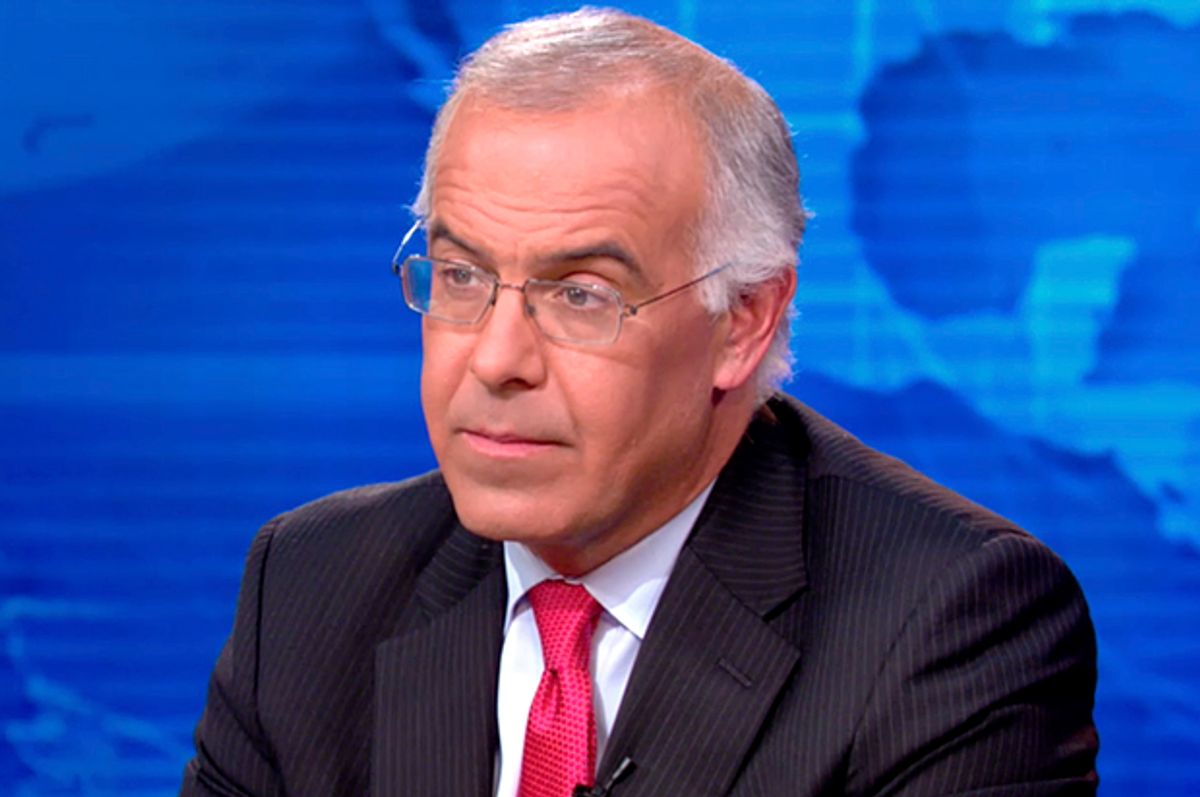It’s just possible that the chaos of the Republican primaries may shift American perspectives back to top dead center. That is, the nuttiness of the current crop of candidates may finally show that Obama isn’t some crazed Kenyan Muslim socialist but a staid American trying to live by moral standards developed centuries ago here at home.
That, at least, is the initial takeaway from today’s column by David Brooks in The New York Times. Though he tries—for old time’s sake—to include Bernie Sanders and Hillary Clinton in his crop of loonies, it is the Republicans who are making him nostalgic—already—for Obama. It is they who may be waking him to recognition that, to take a page from the first of the 12 Steps of Alcoholics Anonymous, the right-wing movement he is a part of has become unmanageable.
Though he tries to stay true to his conservative roots by saying of Obama that he has “been disappointed by aspects of his presidency” and hopes “the next presidency is a philosophic departure,” he gives no details about what he means. Perhaps he’s disliked Obama for so long that changing his tune completely is not something he’s quite ready to do. Maybe he needs the 90 meetings in 90 days of a political AA. The process of recovery takes time, after all, and concerted effort.
Here’s the heart of his first, tentative recognition of his disease:
Many of the traits of character and leadership that Obama possesses, and that maybe we have taken too much for granted, have suddenly gone missing or are in short supply.
Trouble is, Brooks is the kid who, after murdering his parents, asks for mercy as an orphan. Still, we should welcome him into recovery. “Hi, my name is David and I’m a political opportunist.”
American politics has been nasty since the days of Alexander Hamilton. We’ve even had a member of the House attack a senator in the Capitol, though that was 160 years ago. Little has changed. We still manage to allow our politicians to be shot (Gabrielle Giffords being the last, just five years ago). Wearing conservative specs, being well coifed and dressed and living in the rarified air of the Washington punditocracy has never removed one from responsibility for the rough and tumble. Those very people who disdain it often prove to be responsible for it.
By abetting an image of a bifurcated political world, Brooks has helped further the vilification of Obama and the Republican descent into the politics of hatred. The us-versus-them, good-guy-versus-bad-guy simplistic vision of the political world that continues to dominate in the United States has long been augmented by the need for people who never step out of character on television—and Brooks has willingly been one of those characters. That he is now trying to change is good. What’s bad is that he seems completely unwilling to accept his own culpability in creation of the contemporary toxic political environment.
Imagine if, eight years ago, Brooks had admitted Obama’s essential integrity—had, in fact, trumpeted it. What if he had convinced others of his political stripe that it was better to lose with dignity to a dignified opponent than to continue slash-and-burn politics? He writes that Obama “and his staff have generally behaved with basic rectitude.” What if he, and those he influences, had been willing to state that during the 2012 election? Would our current milieu of political hate be quite so strong? Instead of egging on the attacks on Obama appointees, what if Brooks had long ago admitted that the administration has “mostly attracted and hired people with high personal standards”? Could he have helped break the logjam of Senate confirmations that has been hampering our government and our courts since Obama’s election?
Instead of lauding, at this late date, Obama’s “sense of basic humanity,” what if Brooks had long ago argued against those who type the president as Satan? Obama has “exuded this basic care and respect for the dignity of others time and time again.” That’s not, as Brooks admit, a recent aspect of his character. What if Brooks had extolled that through the years and not just now?
Brooks even admits that there’s “a soundness in his decision-making process.” He writes that “a president has to maintain equipoise under enormous pressure. Obama has done that, especially amid the financial crisis.” Why did he not applaud back then? Finally, he congratulates Obama for his “resilient sense of optimism.” Yet Brooks has long been part of the forces attacking American optimism (if not directly, by association); the idea that the United States is going to hell in a handbasket has long been one of the right’s basic tenets. “Make America Great Again” did not pop onto Trump’s forehead wholly formed.
Perhaps we shouldn’t be too hard on Brooks right now. Perhaps he is going through the sort of recognition that an alcoholic has when seriously starting on a 12-step program. Maybe he will soon reach a point where he looks carefully at Step 4, where he is asked to make a moral inventory of himself and consider the impact of what he has been doing. And Steps 8 and 9, where one lists all of the people one has harmed through one’s disease and then sets out to make amends.
Oh, and Step 10, admitting when one is wrong.




Shares